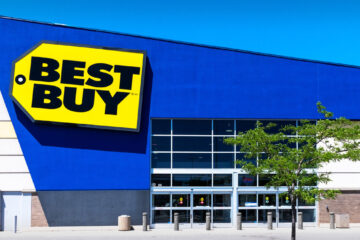One of the most fascinating parts of the retail industry in recent years has been the athletic-apparel space.
Often referred to as athleisure, this corner of the fashion industry is a relative newcomer. Fifty-odd years ago it may have been harder to come across such a broad array of choices for your favorite sport or workout. And when you did find clothes for such an activity, you were often limited to a select few brands and styles for that workout.
Related: Nike’s biggest problem is a fast-growing rival
But gone are the days of sweatpants at the gym and Converse on the basketball court. Nowadays, everybody has their preferred brand for workouts — or just lounging around the house and running errands.
For many people, especially women, that preferred brand is Lululemon (LULU) . The Canadian label is best known for buttery-soft fabrics in its lineup of things like popular leggings and workout jackets.
Lululemon surged in popularity during and after covid, when few of us were expected in an office five days a week and it became much, much more socially acceptable to wear yoga pants to the grocery store and post office, around the neighborhood and — when it eventually reopened — the gym.
A Lululemon store in the Meatpacking District neighborhood of Manhattan.
Jeff Greenberg/Getty Images
Rivals challenge Lululemon
But popularity can be a double-edged sword, particularly in the modern age, where social media are obsessed with discovering so-called dupes, cheaper versions of popular brands that often are almost indistinguishable from the real thing.
TikTok is filled with hundreds of thousands of posts and tags featuring phrases like “Lululemon dupe,” “Amazon Lululemon dupe” and “Lululemon knock offs.”
Related: TJ Maxx goes viral for selling cheap dupe of $2,400 jewelry
A quick query online turns up dozens of websites purporting to sell just-as-soft high-performance yoga pants and pullovers for a fraction of Lululemon’s pricing. (One pair of Lululemon’s popular Align yoga leggings retails for about $100.)
The high-flying yoga brand has attempted to put a stop to the seemingly ever-growing dupe culture, even hosting events where customers can trade in their so-called Lululemon dupes for the real thing.
One competitor to LULU keeps growing
But not everybody is interested in ripping off Lululemon for a quick profit. Other brands have created empires in their own right by appealing to a similar aesthetic and demographic and iterating on what makes a brand like Lululemon so popular in the first place.
One such brand is Vuori, an athletic-apparel company that also targets the yoga and comfort-seeking crowd. Its proponents swear Vuori clothes are just as soft — if not softer — than Lululemon’s, and its leggings are similarly priced at around $90 a pair. Customers also appreciate the company’s environmental consciousness, color ranges and lack of logos.
“The quality is top notch, and the look is flattering to the physique,” one Reddit user wrote of Vuori.
More Retail:
Ulta CEO sounds the alarm on a growing problemLululemon releases a first-of-its-kind productTarget store introduces a new ‘over 18’ policyAmazon launches genius new subscription product
“I love the material and the colors. I’m just not into the fluorescent colors and hideous patterns of LLL [Lululemon],” another wrote.
No surprise, then, that the company, based in Encinitas, Calif., near San Diego, has been growing at a rapid clip. And it’s now expanding into international markets: In mid-May it opened its first brick-and-mortar store in China, within Shanghai’s Jing’an Kerry Centre.
Most of Vuori’s physical store locations are in the U.S., so expansion into China marks a milestone for the brand. The Shanghai outlet is Vuori’s 67th store.
Related: Amazon adds another luxury brand to take on Sephora
“In 2025, you can expect additional stores in the U.K. and China, and for us to open our first store in the Middle East with a partner,” the company says. “We’ll also continue to expand our partnerships in Korea (with the Shinsegae Group) and Mexico (with Innergy Brands), and build our digital and wholesale businesses across our focus countries.”
Vuori — the word means “mountain” in Finnish, apparently in line with Founder Joe Kudla’s passion for mountain climbing — says it has been profitable since 2017, which was just two years after he founded it.
It has been rapidly gaining not only market awareness but preference, especially among young shoppers. Piper Sandler’s annual Teen Survey found in 2024 that Vuori shot up from the 24th most popular athletic-apparel brand among teens to the 15th spot in just one year.
Related: Veteran fund manager picks favorite stocks for 2024


